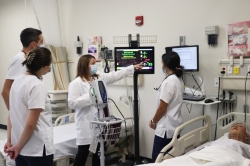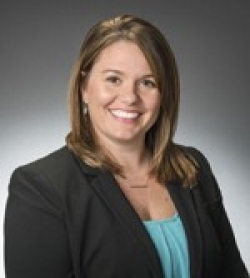Dr. Michelle McKay Honored with Distinguished Educator in Gerontological Nursing Designation

Seeing an increase in older adults with trauma-related injuries among her critical care patients, Assistant Professor Michelle McKay PhD, RN, CCRN, took note and realized their urgent need for more specialized care. That observation, along with family experiences and exemplars, led her to dedicate her career to research, clinical practice and teaching excellence related to older adults. Her body of work was recognized by the National Hartford Center of Gerontological Nursing Excellence (NHCGNE) with its Distinguished Educator in Gerontological Nursing designation. New designees were celebrated at a ceremony during NHCGNE’s Annual Conference held virtually October 24-26.
NHCGNE bestows the honor in recognition of the need to have highly competent educators with knowledge and skill in the care of older adults to prepare the future nursing workforce for the rapidly growing older adult population and “foster positive attitudes toward older adults.”

“My mission as a nurse educator is to adequately prepare the nursing workforce to care for older adults within our communities. Care is being delivered more at home and many older adults want to age in place. Nurses are key to developing and maintaining health care systems that can support the needs of older adults,” explains Dr. McKay. In terms of her positive influencers, she cites her mother who is a nurse, her grandparents for whom she was a caregiver while a high school student, along with “mentors throughout my doctoral program and in my current role as an assistant professor, including other wonderful gerontological nurses including Drs. Melissa O’Connor and Christina Whitehouse.”
While she balances clinical practice with research in the area of falls and fall prevention in older adults, she also is energized with teaching the next generation. Dr. McKay explains, ‘Helping students translate nursing theory into practice at the bedside, understand the unique needs of this population, and how nurses provide high quality care to support older adults throughout the aging process is a very rewarding educational process.”
Dr. McKay notes, “The older adult population is growing, and it is up to us as gerontological experts to share the joys and triumphs that we have experienced working with and caring for older adults. By sharing our experiences, we can prepare a future nursing workforce that is competent and ready to meet the challenges of living with and caring for an aging society.”
